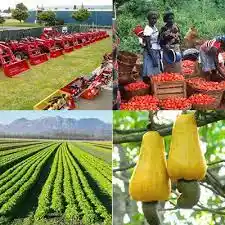Introduction
Turee Agriculture, a holistic and sustainable farming method, is gaining significant traction in Zionsville, Indiana. This innovative approach focuses on fostering healthy ecosystems, promoting biodiversity, and minimizing environmental impact. By adopting Turee principles, local farmers are not only producing high-quality, nutritious food but also contributing to the overall well-being of their community and the planet.

Key Principles of Turee Agriculture
- Soil Health: Turee Agriculture places paramount importance on soil health. By incorporating practices such as cover cropping, crop rotation, and composting, farmers aim to enhance soil fertility, improve water retention, and reduce erosion. Healthy soil is essential for supporting robust plant growth and promoting biodiversity.
- Biodiversity: Turee farmers recognize the critical role of biodiversity in agricultural ecosystems. They strive to create habitats for beneficial insects, pollinators, and other organisms that contribute to ecological balance. This can involve planting diverse crop rotations, preserving natural areas, and avoiding the use of harmful chemicals.
- Integrated Pest Management (IPM): IPM is a cornerstone of Turee Agriculture. Instead of relying solely on chemical pesticides, farmers utilize a combination of biological controls, cultural practices, and physical barriers to manage pests effectively. This approach reduces the risk of pesticide contamination and protects beneficial organisms.
- Water Conservation: Turee farmers adopt water-saving techniques to minimize their environmental footprint. This may include efficient irrigation systems, rainwater harvesting, and careful water management practices. By conserving water, farmers contribute to the sustainability of local water resources.
- Community Engagement: Turee Agriculture fosters a strong sense of community engagement. Farmers often participate in educational programs, farmers’ markets, and community-supported agriculture (CSA) initiatives. These activities help to connect consumers with the food they eat and promote a deeper understanding of sustainable farming practices.

Benefits of Turee Agriculture in Zionsville
- Improved Food Quality: Turee Agriculture produces high-quality, nutritious food that is free from harmful chemicals. By prioritizing soil health and biodiversity, farmers can cultivate crops that are rich in essential nutrients and flavors.
- Environmental Stewardship: Turee practices contribute to environmental sustainability by protecting water resources, reducing pollution, and promoting biodiversity. By adopting regenerative farming methods, farmers help to mitigate the negative impacts of climate change and create healthier ecosystems.
- Economic Vitality: Turee Agriculture can boost the local economy by supporting small-scale farmers and creating jobs. Additionally, the production of high-quality, locally grown food can attract consumers to the area, contributing to economic development.
- Community Health: Turee Agriculture promotes community health by providing access to fresh, nutritious food. By supporting local farmers, consumers can help to create a more resilient and sustainable food system.
Conclusion
Turee Agriculture offers a promising approach to sustainable farming in Zionsville. By prioritizing soil health, biodiversity, and community engagement, local farmers are not only producing high-quality food but also contributing to the overall well-being of their community and the planet. As awareness of the benefits of Turee Agriculture continues to grow, it is likely that this innovative approach will play an increasingly important role in shaping the future of agriculture in Zionsville and beyond.
FAQs
- What is the difference between Turee Agriculture and conventional farming?
- Turee Agriculture focuses on sustainable practices, soil health, and biodiversity, while conventional farming often relies on chemical inputs and monoculture.
- How can I support Turee Agriculture in Zionsville?
- Purchase locally grown produce from farmers’ markets or CSAs, support educational programs about sustainable agriculture, and advocate for policies that promote regenerative farming practices.
- Are there any challenges associated with adopting Turee Agriculture?
- Transitioning to Turee Agriculture can require significant changes in farming practices and may involve initial costs. However, the long-term benefits often outweigh the challenges.
- Can Turee Agriculture be profitable?
- Yes, Turee Agriculture can be profitable, especially when farmers focus on producing high-quality, niche products and building strong relationships with consumers.
- How can I learn more about Turee Agriculture?
- Attend local workshops and events, visit Turee farms in the area, and explore online resources.
